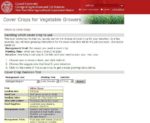The educational materials listed on this page are about Soil Management.
Soil management encompasses a number of strategies used by farmers and ranchers to protect soil resources, one of their most valuable assets. By practicing soil conservation, including appropriate soil preparation methods, they reduce soil erosion and increase soil stabilization. These soil conservation methods allow for healthy soil formation, soil fertility and favorable soil composition, including soil permeability and soil porosity, which lead to increased soil health. Soil organic matter is a critical component of soil health. Cover crops can help maintain or increase soil organic matter. By using a variety of soil management practices, soil organic matter will increase while soil erosion will decrease, keeping soil nutrients on the farm. Farmers typically use a soil analysis, or soil sampling procedure, to determine what inputs are needed. Key practices include composting, soil chemistry, nutrient mineralization, soil quality/health, organic matter, cover crops, green manures, soil analysis, soil microbiology, soil physics.
Showing 1-6 of 6 results
UMass Soil Health Testing Guide
This guide to soil health testing was created to simplify soil health and make soil health more accessible for both educators and stakeholders. This resource is not exhaustive; the emphasis is on simple, free, chemical and physical assessments. Additional information is provided about fee-for-service laboratory tests where appropriate. Some users may find value in reviewing […]
How Alive is My Soil?
This guide presents soil testing methods that can be performed in the field by farmers, gardeners, or anyone who desires to understand and appreciate soil from a different perspective. While these tests aren’t intended to be a replacement for sending soil to a lab, they can be considered complementary to annual or biannual lab analysis.

Cornell Soil Health Assessment
The Cornell soil health assessment was created to help farmers develop appropriate management solutions to build healthy soils. Focusing on soil health helps improve productivity, reduces the need for external inputs, and increases a farm's resilience to extreme weather events.

New York Cover Crops Decision Tool
This is an online tool to help you quickly narrow the choices of cover crop for your situation. In a few seconds, you will have growing instructions for the cover crop that will do the job you need. Access the Cover Crops Decision Tool now. It is designed for the soil, climate, cropping practices and […]

Crediting Cover Crops and Soil Organic Matter in a Variable Rate Nitrogen Fertilizer Prescription
Crop growth depends on available nitrogen (N) in the soil, much of which comes from mineralization of soil organic matter and other organic residues, such as cover crops. The amount of mineralized N available to a crop depends on several biological and environmental factors such as temperature, moisture, soil texture, the total quantity of organic […]

Buckwheat Cover Crop Handbook
Buckwheat has been used to suppress weeds on Northeastern farms for 400 years. This handbook outlines how to use buckwheat as an economical weed-control tool, with recommendations based on extensive grower surveys, original research and on-farm trials.